
by Salma (Canada) | Sep 12, 2014 | 2014, Awareness, Girls, Human Rights, Humanity, International, Salma, Women's Rights, World Motherhood
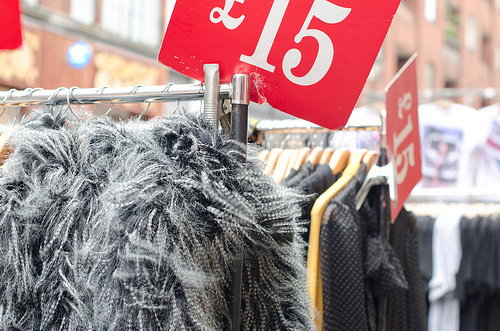
“…we are living in a material world, and I am a material girl…”
Madonna’s tune rings true today more than ever. Parents in the ’80s may have pulled their hair out trying to teach their kids about the perils of materialism, but they had no idea what was to come. They could not have known that the whole world would be turned upside down all for the price of cheap clothes and goods. (more…)

An Imperfect Stepford Wife is what Salma describes herself as because she simply cannot get it right. She loves decorating, travelling, parenting,learning, writing, reading and cooking, She also delights in all things mischievous, simply because it drives her hubby crazy.
Salma has 2 daughters and a baby boy. The death of her first son in 2009 was very difficult, however, after the birth of her Rainbow baby in 2010 (one day after her birthday) she has made a commitment to laugh more and channel the innocence of youth through her children. She has blogged about her loss, her pregnancy with Rainbow, and Islamic life.
After relocating to Alberta with her husband in 2011 she has found new challenges and rewards- like buying their first house, and finding a rewarding career.
Her roots are tied to Jamaica, while her hubby is from Yemen. Their routes, however, have led them to Egypt and Canada, which is most interesting because their lives are filled with cultural and language barriers. Even though she earned a degree in Criminology, Salma's true passion is Social Work. She truly appreciates the beauty of the human race. She writes critical essays on topics such as feminism and the law, cultural relativity and the role of women in Islam and "the veil".
Salma works full-time, however, she believes that unless the imagination of a child is nourished, it will go to waste. She follows the philosophy of un-schooling and always finds time to teach and explore with her children. From this stance, she pushes her children to be passionate about every aspect of life, and to strive to be life-long learners and teachers. You can read about her at Chasing Rainbow.
More Posts - Website
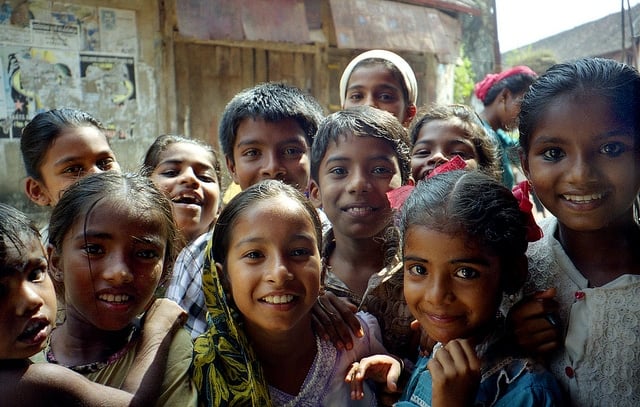
by World Moms Blog | Aug 28, 2014 | 2014, Awareness, Being Thankful, Childhood, Cultural Differences, Culture, Domesticity, Education, Eye on Culture, Family, Grandparent, Guest Post, Home, India, International, Kids, Life Lesson, Motherhood, Nutrition, Parenting, Relationships, Traditions, World Motherhood, Younger Children
 Motherhood is one of the most beautiful experiences of a woman’s life. Raising children makes life full. I am raising my children in India and I feel that the environment in India helps a lot in inculcating a strong set of values.
Motherhood is one of the most beautiful experiences of a woman’s life. Raising children makes life full. I am raising my children in India and I feel that the environment in India helps a lot in inculcating a strong set of values.
I read a lot about the many ways children are raised in various parts of the vast Indian subcontinent. Here are some of the enriching reasons I find raising a child in India so wonderful:
1. Family Help: India is a country where the joint family system is prevalent. Children grow up having a lot of fun surrounded by generations of Grandparents, Uncles, Aunts and Cousins. This helps the child in her personal growth and instills great concepts like teamwork and adjusting to different kinds of people, with different mindsets. It also helps a child understand how to receive and give unconditional love.
Sadly, the joint family is breaking up nowadays and giving way to nuclear families. The nuclear family comprises of just the husband, wife and children. Sometimes, the husband’s parents come to stay. This helps build a strong bond between the children and the grand parents, which should be encouraged. The child will learn to respect traditional values which are an integral part of the Indian social fabric.
2. Learning to Respect Your Elders: Indian children are taught to respect their elders and extended family at a young age. Being around so many family members, children learn to show respect and love to one and all when they grow up. Some communities in India make it compulsory for the young people to touch the feet of the elders as the mark of reverence.
This custom is rarely found in any other culture across the world. This custom is instilled in the child’s mind from a very young age and it becomes second nature. This custom hasn’t changed even after western ideas and practices stealthily crept into India.
3. Kids Are Taught How to Save: Children in India are taught to save and not spend unnecessarily. Due to the conservative economy, Indian children learn at a very young age to prioritise their expenses. They learn to buy things which will give them value for money.
Nowadays many banks offer the option to open minor accounts for very small children. Instead of having children save their pocket money in piggy banks, they can save it in real banks. This teaches the child banking procedures at a very early age. Children can even maintain a separate copy for calculating the total expenditure. This will teach the child that it is not good to waste money.
4. Family Values: Children are inculcated with strong family values as they grow up among numerous family members. These family values help develop strong moral fiber. In the long run, they help in creating a strong personality which helps in their growth.
5. Character Development: Character defines how the child leads a holistic life. Parents in India work hard on character building for their child. Since all parents’ desire that their child grows up to become an honest and good human being.
6. Spiritual Discipline: Indian children are raised with enormous spiritual discipline. India is the land for spiritual growth and developing the spiritual qualities in a child helps him/her grow up to be a better individual. Children are taught about the importance of religion and customs. They are also taught to respect other religions as well, since the common idea of all religion is to achieve peace, moral strength and happiness.
7. Freedom When They Play: There is no requirement for an organized play time. A child will always find a group of children playing outside his house. So they can always find fun. They can step out any moment and experience a joyous playtime. Open spaces or children’s parks are still there and are not encroached by developmental activities and high rises.
8. Sharing and Caring: There is a lot of sibling bonding in Indian families. Parents teach children tolerance towards each other, love and patience. By sharing and caring for each other, this turns them into well-adjusted human beings.
9. Celebrating Traditions: India has one of the richest cultures which dates back more than 5000 years. So India is a land of festival and colors, cliché as it may sound, it is true. These celebrations are elaborate. All the kids are involved in the celebration of the festivals with the other children in the community. The children celebrate the festivals with their families and extended families.
10. Healthy Eating Habits: Emphasis is laid on eating healthy food. Children are allowed to eat junk food once in a while, but mothers cook at home. They are happy to feed the children with home cooked food. This makes the child health conscious. Mothers teach their children to choose healthy fresh fruits and vegetables. This also increases their knowledge about what is good for them.
The above stated facts hold true for a small portion of the Indian population, as the phrase goes ‘the privileged few’. Economically, India has progressed considerably in the last 60 years. The bigger picture, however, is quite different: a farmer hangs himself from a tree because he cannot provide for his family; a child is shunned from temples and public places due to his lower caste label; the rampant poverty in villages and lack of health amenities lead to reduced life expectancy; more children are seen carrying bricks and working in factories than in classrooms. These are children who don’t have access to formal education at all.
But for increasingly more kids, growing up in India is a blissful experience which helps them develop into amazing individuals. The calmness of spirit and the enriching environment in India is what gives these children an opportunity to explore life and themselves. The liveliness of the child is based on the amazing cultural forum that the Indian child inherits.
In contrast, malnourished children peddle the streets and somehow make a living. They are deprived of things that my child claims as basic rights. We have small children selling chai when they should be drinking a warm glass of milk instead. Yet from children like these, a leader has emerged – Narendra Modi. The contradictions and ironies of my country keep me enthralled. I trudge forward in earnest hope that my child will triumph in all spheres of her life.
Also, the technological development and fast paced life have made us so busy that we are finding less and less time for each other but still Indians never forget to smile at one another. Children brought up in India will never lose heart, since they have learned to struggle and attain victory in all fields of life. But to make that happen, we need to remember the wisdom Dr. Seuss imparted:
“Unless someone like you cares a whole awful lot, nothing is going to get better. It’s not.” — The Lorax
The image used in this post is credited to Ryan Ready. It holds a Flickr Creative Commons attribution license.
This is a first-time, guest post from Aradhana, a mother in India. Aradhana also is a passionate writer, who focuses on topics like yoga, wellness, health and lifestyle. She has contributed posts to Natural News, Wiki How, MomJunction, and Elephant Journal. Through her writings, she hopes to motivate people to develop healthy habits and adopt natural ways of living to achieve sound health.
World Moms Blog is an award winning website which writes from over 30 countries on the topics of motherhood, culture, human rights and social good. Over 70 international contributors share their stories from around the globe, bonded by the common thread of motherhood and wanting a better world for their children.
World Moms Blog was listed by Forbes Woman as one of the "Best 100 Websites for Women 2012 & 2013" and also called a "must read" by the NY Times Motherlode in 2013. Our Senior Editor in India, Purnima Ramakrishnan, was awarded the BlogHer International Activist Award in 2013.
More Posts

by Elizabeth Atalay | Aug 26, 2014 | 2014, Health, Humanitarian, International, Shot@Life, Social Good, Vaccines, World Moms Blog, World Voice
We are so proud that three World Moms have been selected this year to be United Nations Foundation Social Good Fellows and to take part in #Blogust to benefit Shot@Life. Two other World Moms also wrote posts for #Blogust as Shot@Life Champions. #Blogust is a social good relay sponsored by Walgreens to benefit the United Nations Foundation’s Shot@Life campaign which provides life saving vaccines to children around the world.

World Moms Advocating for Global Health: Nicole Morgan from “Sisters from Another Mister”, Jennifer Burden (World Moms Blog Founder), and Nicole Melancon of “Thirdeyemom” will all be heading to NYC this September as Social Good Fellows with the UN Foundation.
Every child deserves a Shot@Life, and we at World Moms Blog are thrilled to be able to use our voices for social good. Each day for the month of August one writer will share their story of Happy & Healthy Firsts. Every time a post is commented on or shared on social media a vaccine is donated by Walgreens to a child in need. We encourage you to read, comment on, and share our posts, and know that when you do, you are using your voice for social good as well.
United Nations Foundation Social Good Fellows & #Blogust Bloggers:
Nicole Morgan on the Shot@Life Blog: “Honored and humbled to be among 25 Social Good Fellows chosen by the United Nations Foundation and shot@life for Blogust 2014 because social good is dear to my heart and teaches my girls to pay it forward. Accountability and looking out for others is part of day to day parenting.” Read More…
Jennifer Burden on World Moms Blog: “So, tell me now, have you ever experienced any “firsts” growing up that were better than you ever expected or were highly impressionable on who you are today? Many highly anticipated first experiences often come and go forgotten or don’t really mean anything today in retrospect, right? But, here’s a story of one first in my life that made an impact, and I admit to even going back for more! It’s not chocolate, but could have been chocolate, but no, it wasn’t.” Read More…..
Nicole Melancon on the Shot@Life Blog: “We all remember the firsts: those monumental moments that shape your life and those around you. The moments that take your breath away. The first word. The first step. The first “I love you”. The first day of school. The first kiss. The first goodbye. Firsts that impact our journeys down the long and sinuous path of life.”Read More…..
Shot@Life Champions:
Sarah Hughs on Finnegan and the Hughes: “Today is my birthday! It’s a big day and my last year before I start a new age group, 40 and up! It’s my first time ever turning 39. I think 39 is a milestone. I have heard many that claim to have turned 39 over and over again. It’s funny how they never get to 40. I’m ok with the big 4-0 and have decided I will celebrate and be proud of 40 because that is a huge milestone!” Read More…..
Elizabeth Atalay on Documama: “This is my first time. My first time letting go. My oldest child goes off to school in another state next week, and I have to admit, I’m having a tough time with that. The thought that for the first time in her life she will not be living under our roof. For the first time I have to trust her to the outside world. For the first time I won’t be right there for her for whatever she needs, and let’s face it, I can’t check on her whenever I need for my own piece of mind.” Read More….
Nicole Morgan on Sisters from Another Mister: “Blogging has blessed my life more than I ever could have imagined. It started as a way to kill time while waiting on my younger homeschooler, in lieu of my then obsession with Farmville … (and OMGawsh reading thro the comments from that post reminds me of the great friendships born) altho as for games, now whisper quietly”. Read More…
Nicole Melancon on ThirdeyeMom: “I’m honored that my Shot@Life post “Blogust: Reaching Firsts and Making a Difference” is live today on the United Nations Foundation’s website. Blogust is a month-long digital dialogue, bringing more than 25 of the most beloved online writers, photo and video bloggers and Shot@Life champions (me!) together to help change the world through their words and imagery throughout the month of August. For every comment and/or social media share, Walgreens will donate one life-saving vaccine to a child in need around the world.” Read More…
AND, WAIT, THERE’S MORE!!
World Mom, Cindy Levin, the Anti-Poverty Mom, has an appointment this week with US Representative Wagner’s Office in Missouri this week to lobby for life-saving vaccines. Way to put things into action, Cindy!!
During Shot@Life’s Blogust 2014—a month-long blog relay—some of North America’s most beloved online writers, photo and video bloggers and Shot@Life Champions will come together and share stories about Happy and Healthy Firsts. Every time you comment on this post and other Blogust contributions, or share them via social media on this website, Shot@Life and the United Nations Foundation pages, Walgreens will donate one vaccine (up to 60,000). Blogust is one part an overall commitment of Walgreens donating up to $1 million through its “Get a Shot. Give a Shot.®” campaign. The campaign will help provide millions of vaccines for children in need around the world. Today’s #Blogust post is by our friend and photographer Anne Geddes!

Elizabeth Atalay is a Digital Media Producer, Managing Editor at World Moms Network, and a Social Media Manager. She was a 2015 United Nations Foundation Social Good Fellow, and traveled to Ethiopia as an International Reporting Project New Media Fellow to report on newborn health in 2014. On her personal blog, Documama.org, she uses digital media as a new medium for her background as a documentarian. After having worked on Feature Films and Television series for FOX, NBC, MGM, Columbia Pictures, Warner Brothers, 20th Century Fox, and Castle Rock Pictures, she studied documentary filmmaking and anthropology earning a Masters degree in Media Studies from The New School in New York. Since becoming a Digital Media Producer she has worked on social media campaigns for non-profits such as Save The Children, WaterAid, ONE.org, UNICEF, United Nations Foundation, Edesia, World Pulse, American Heart Association, and The Gates Foundation. Her writing has also been featured on ONE.org, Johnson & Johnson’s BabyCenter.com, EnoughProject.org, GaviAlliance.org, and Worldmomsnetwork.com. Elizabeth has traveled to 70 countries around the world, most recently to Haiti with Artisan Business Network to visit artisans in partnership with Macy’s Heart of Haiti line, which provides sustainable income to Haitian artisans. Elizabeth lives in New England with her husband and four children.
More Posts
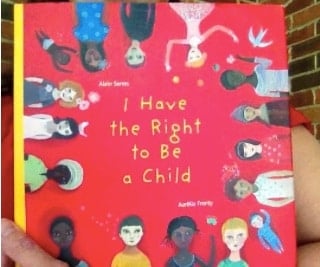
by Cindy Levin | Jun 10, 2014 | 2014, Childhood, Human Rights, Humanitarian, International, Kids, Multicultural, Social Equality, Social Good, United Nations, World Voice

I’ve recently introduced a picture book into my family’s reading time called “I Have the Right to Be a Child” by Alain Serres. With beautiful simplicity, the book provides the author’s interpretation of the United Nations Convention on the Rights of the Child. The Convention includes things like rights to education, gender equality, nutrition, health care, free speech, freedom from child labor, safety, etc. For kids, the book is a conversation starter about human rights. We talked a lot about the question, “What are rights and what are privileges?” For adults, the book is a reminder that these concepts really are not that complicated. It may be complicated in the implementation of granting rights, but when the rights themselves are asserted in the simple language of the children the Convention seeks to protect, it all becomes much more clear.

This is probably the first time my kids saw human rights presented in a way that was meaningful to them. In American museums and text books, the right to vote for women and people of color seems faraway and a “done deal.” They don’t think of those rights as things we continually need to address here and in other countries. My children often help me advocate to give children in developing countries access to school and vaccines, but the language of “rights” isn’t always included in those kinds of discussions.
My youngest really latched on to the page that said,
“I have the right to express myself completely freely, even if it doesn’t always please my dad, and to say exactly how I feel, even if it doesn’t always please my mom.”
We have a lively ongoing debate about how that plays out. If she has the right to express herself completely freely, how might that compete with my perceived right not to be disrespected in my own home or the rights of her other friends and family members?
It might be surprising to Americans to learn that while 194 states in the world have agreed to the Convention, the U.S. has not officially ratified it. In fact, every member of the United Nations except Somalia, the United States, and South Sudan are party to the Convention, having agreed to change or make laws and to develop practices and programs to support it. The U.S. has signed to show support, but hasn’t “ratified” it. Ratification requires being bound by international law and having to report regularly to the UN Committee on the Rights of the Child, which monitors compliance.
Why hasn’t the U.S. ratified? Katie Jay – author of the “Children Deserve Families” blog told me that recognizing that children have a right to a safe and secure permanent family is cutting edge human rights law. The idealistic part of me scoffs at that, saying;
“Really? Cutting edge? To provide security, safety, and nourishment to children is cutting edge?” But the lobbyist part of me knows that it can sometimes be a tricky thing for a country to formally declare something as a “human right.”
Because once you officially do that, then you have to do something about it…or be held accountable by an international authority and possibly give up your moral high ground if you are then seen as a country that doesn’t live up to its own standards. Sadly, from the standpoint of an American citizen who has watched our behavior on international environmental agreements with dismay, I can tell you that Americans generally don’t like the idea of international authority holding us accountable for just about anything.
Has your country ratified the Convention? Take a look at this paraphrased list of rights for children from the book and consider which of them you think are rights or privileges. Are all of them rights? What would be the ramifications for your country to truly grant that right in your country? Internationally? What benefits or problems do you see that could arise if the world embraced the Convention wholeheartedly?
- I have the right to a first name, a last name, a family, and a country that I can call my home.
- I have the right to have enough food to eat and water to drink.
- I have the right to live under a roof, to be warm, but not too hot, not to be poor and to have just enough of what I need, not more.
- I have the right to be cured with the best medicines that were ever invented.
- I have the right to go to school without having to pay.
- I have the same rights whether I am a girl or a boy.
- I have exactly the same right to be respected whether I am black or white, small or big, rich or poor, born here or somewhere else.
- I have the right to be helped by my parents, my friends, and my country if my body doesn’t work as well as other children’s.
- I have the right to be free from any kind of violence, and no one has the right to take advantage of me because I am a child.
- I have the right to go to school and refuse to go to work.
- I have the right to be protected by adults and to be sheltered from disasters
- I have the right never to experience war or weapons.
- I have the right to breathe clean air.
- I have the right to play, to create, to imagine, and also to have friends.
- I have the right to learn about friendship, peace and respect for our planet.
- I have the right to express myself completely freely.
This is an original post written for World Moms Blog by Cindy Levin.
Cynthia Changyit Levin is a mother, advocate, speaker, and author of the upcoming book “From Changing Diapers to Changing the World: Why Moms Make Great Advocates and How to Get Started.” A rare breed of non-partisan activist who works across a variety of issues, she coaches volunteers of all ages to build productive relationships with members of Congress. She advocated side-by-side with her two children from their toddler to teen years and crafted a new approach to advocacy based upon her strengths as a mother. Cynthia’s writing and work have appeared in The New York Times, The Financial Times, the Washington Post, and many other national and regional publications. She received the 2021 Cameron Duncan Media Award from RESULTS Educational Fund for her citizen journalism on poverty issues. When she’s not changing the world, Cynthia is usually curled up reading sci-fi/fantasy novels or comic books in which someone else is saving the world.
More Posts - Website
Follow Me:


by Ms. V. (South Korea) | May 27, 2014 | 2014, Babies, Expat Life, Family, International, Korea, Multicultural, Parenting, Relocating, S. Korea, Siblings, World Moms Blog, World Motherhood

Hello from Washington State!
I can hardly believe it’s already been three months since we arrived from Korea. We just unpacked our last boxes of books last week and are finally feeling a bit settled. The transition took much longer coming back than it did going.
Neither my spouse nor I was prepared for the culture shock we would experience returning to the country of our birth. Parenting in the States is a whole other ball game, and we are still getting our bearings.
We also underestimated how difficult it would be for our son, who had only been here once when he was 7 months old. Despite our best intentions and what we thought was good preparation, it was a hard landing for all of us.
Thankfully, things are starting to change and we’re all feeling comfortable and content and present. It’s been three months of feeling in between two places, with daily (and sometimes hourly) utterly heartbreaking questions from our little one about when we will be returning home to Seoul. And of course, now that we’re all settled, our baby is due to arrive any day, throwing all of our new comfortable routines out the window. Such is life, right? Constant change with all of us just trying to keep up with as much dignity and grace as we can muster.
I find myself filled with unanswerable questions about how life will be with a new baby. Will I have enough time with my firstborn? Will our relationship change? Will I ever have time for myself or my spouse or our relationship? Will my body recover? What will it feel like to be the mother of two? Am I ever going to find my parenting tribe here? And on and on and on.
If I’ve learned anything from the times I’ve lived abroad it’s that unknowns eventually become known and in the meantime, you just make it work. Life will be what it will be.
My husband’s paternity leave has already begun so this morning we all walked down to the Farmer’s Market. It’s one of those perfect Pacific Northwest days with sun and breeze and Mt. Rainier looming. As we drank our hibiscus tea and nibbled on some vegan tamales, all the while surrounded by the heady fragrance of freshly cut bouquets of lilacs, I felt completely at peace, perhaps since the first time since we’ve stepped off the plane.
You know what that means, right? Come on baby. We’re ready.
This is an original post written for World Moms Blog by Ms. V. who we are happy to announce at the time of this posting has given birth to her families’ new addition. Both baby and mom are doing great!
Do you sometimes feel like as soon as you become settled in a routine in life, something inevitable changes creating a new variable?
*Photo uploaded from PotoBucket from Jawandapuck
Ms. V returned from a 3-year stint in Seoul, South Korea and is now living in the US in the beautiful Pacific Northwest with her partner, their two kids, three ferocious felines, and a dog named Avon Barksdale. She grew up all over the US, mostly along the east coast, but lived in New York City longer than anywhere else, so considers NYC “home.” Her love of travel has taken her all over the world and to all but four of the 50 states.
Ms. V is contemplative and sacred activist, exploring the intersection of yoga, new monasticism, feminism and social change. She is the co-director and co-founder of Samdhana-Karana Yoga: A Healing Arts Center, a non-profit yoga studio and the spiritual director for Hab Community. While not marveling at her beautiful children, she enjoys reading, cooking, and has dreams of one day sleeping again.
More Posts
Follow Me:


by World Moms Blog | May 20, 2014 | 2014, Awareness, Girls, Government, Human Rights, Humanitarian, International, Social Good, Social Media, World Moms Blog

As a mother, it is really hard to see other mothers go through certain challenges. I think it’s in me to be supportive in whichever way that I can when there is something I can do about a situation….like the hundreds of Nigerian schoolgirls who have been kidnapped; I marched to show my support on Mother’s Day.
Every mother’s dream is to see her children have the best in life, which includes education. A famous quote by renowned Ghanaian educationist Dr James Kwegir-Aggrey is:
“if you educate a man you educate an individual, but if you educate a woman you educate a whole nation”
This describes the power of educating young girls. It is every girl’s right and boys too to have an education but when these dreams are shattered it becomes a concern to all. Everyone knows the power of education, and it is evident that when a child is educated, he or she is set on the path to greatness.
‘Education is the most powerful weapon which you can use to change the world’- Nelson Mandela.
Taking these girls away from school is like taking them away from their paths to greatness. We hope and pray that they are returned safely to their families. This is why mothers of Ghana joined the campaign to #BringBackOurGirls on this past Mother’s Day in Accra. It was a solidarity march to present a petition to the Nigerian high commissioner in Ghana organised by Yasmeen. A mother herself, she is a songstress with a golden voice and a concerned citizen of our continent Africa. You can listen to her here .
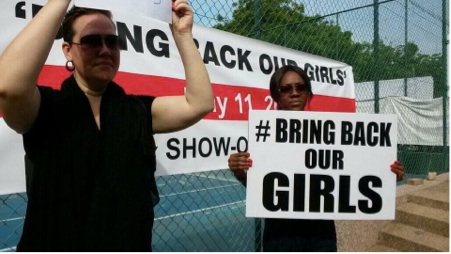
Mother’s Day is no fun if you know that another mother is grieving over her lost child. This was a great initiative by a group who care to march in solidarity in support of the kidnapped Nigerian school girls of Chibok. I saw the post on twitter and immediately wanted to be a part of this great cause. Thank you Yasmin for organising this!
It was an experience for both the young and the old as the children and babies were not left out. There were placards for everyone with ‘Bring Back Our Girls’ boldly inscribed on them. The media was present to cover the event, and the police were also there to ensure the safety of all who came for the walk.
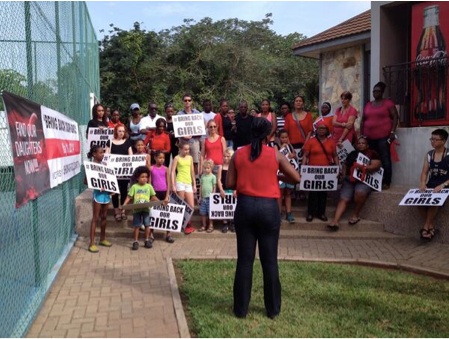
Almost everyone who came wore black and red to signify solemnity. Signatures were also appended on a banner which was later presented to the high commissioner. The walk was through some parts of the capital city of Ghana to the Nigerian High commissioner’s residence. It was such a solemn march and the support was so immense. As mothers everywhere are celebrated this month, let us not forget the ones who are heartbroken over their missing girls.
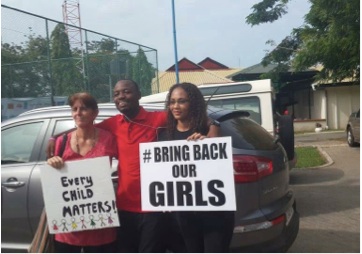
My heart aches each time I think of these girls or see a post about #BringBackOurGirls. We will not relent but continue to pray for the safety of the girls, their families and especially their mothers!
This is an original post written by Adwoa Gyimah of Ghana for World Moms Blog. Photo credits: Adwoa Gyimah
What more can we do to #BringBackOurGirls !?
World Moms Blog is an award winning website which writes from over 30 countries on the topics of motherhood, culture, human rights and social good. Over 70 international contributors share their stories from around the globe, bonded by the common thread of motherhood and wanting a better world for their children.
World Moms Blog was listed by Forbes Woman as one of the "Best 100 Websites for Women 2012 & 2013" and also called a "must read" by the NY Times Motherlode in 2013. Our Senior Editor in India, Purnima Ramakrishnan, was awarded the BlogHer International Activist Award in 2013.
More Posts



















